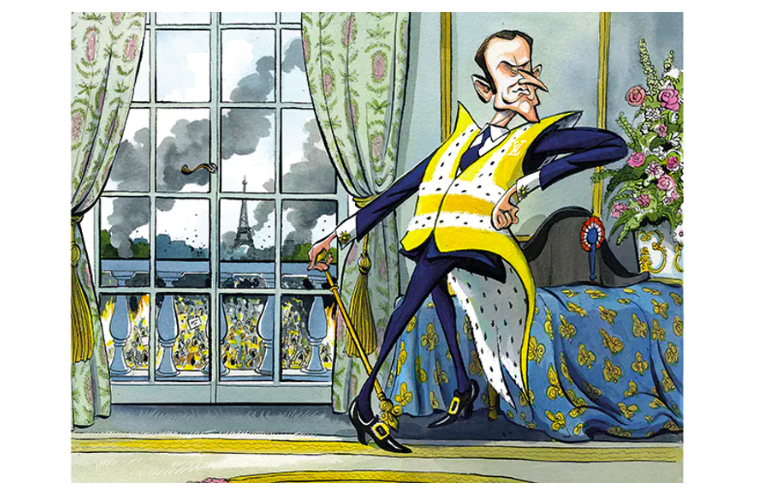For 21 weeks now the Gilets Jaunes have taken to the streets of French cities to protest. It began as a demonstration against high and rising fuel taxes. These tax increases hit families getting children to school and the adults to work, and cut the earnings of the self-employed working from their vans and cars. The higher fuel taxes and slower speed limits were part of President Macron’s policy to curb carbon dioxide emissions. For his trouble the protesters put out of action a majority of the speed cameras, showing him what they thought of his wish to control their lives. The street actions have been stoked by some angry students and by committed protesters of the extreme left and right, but many of those protesting are doing so for the first time. They are people frustrated by low incomes, a lack of progress in living standards, high taxes and a feeling the political class do not listen to them. It is a truly populist movement in a continent of populist parties.
The old French political party system collapsed some time ago. The Republicans and the Socialists, the traditional centre right and centre left challengers for power, did not get a candidate in the last two for President. Mr Macron’s movement called En Marche swept in, but is now confronting the very unpopularity which power had cast upon the old parties he displaced. As we approach the European elections, the left is turning more to France Insoumise, and the right to National Rally, a revamped National Front. The problem Macron faces is EU budget rules do not allow big tax cuts, whilst his own green and social policies require specific targeted taxes that are unpopular. Worse still he has cut tax on the rich to try to promote business and investment, which is provocative to many members of the Gilets Jaunes movement.
Mr Macron’s response to the outbreak of protests was to give some policy ground and then to talk. A great national debate has ensued, with the Prime Minister reporting back on the findings yesterday. The main conclusion is French voters want taxes to be lower. They want to spend more of their own money and resent the amount of their earnings taken by government. They do not want public spending cut, so the government needs to find ways of working smarter and cutting costs where it can. It might also want to borrow more, but comes up against the intractable problem of EU budget rules.
To allay the first eruption of anger on the streets the government did roll back fuel tax rises, ended levies on overtime, paid a bonus to minimum wage earners and backed away from any tax rises on low income pensioners. This package increased forecast state borrowing by 0.5% of GDP at a time when the EU was telling France to cut her budget deficit by more. With state debt at 98.7% of GDP, way over the 60% ceiling of the EU, Brussels is not happy with a further boost to the deficit this year. France claims that the ratio of state debt to GDP might just squeeze down by 0.1% in 2019, though that will require a good outturn and maybe some helpful changes to the way the figures are presented. There is a wish to disallow one off changes having an undue adverse impact.
The French economy struggles from high taxes, early retirement at 62, a substantial welfare bill and from supply inflexibilities. Reform is difficult. The Macron government wants to privatise some state assets to free cash for innovation, but has encountered political obstacles to getting on with the sale. There are plans to sell part of the state’s shareholding in ADP, the Paris airports group, in utility Engie, and in Francaise des Jeux the lottery operator. This would offer some modest help but is not on a big enough scale to make much sustained difference to the public accounts. It looks as if Mr Macron is increasingly boxed in. The tax cuts voters want would come with a cost of a higher deficit in the first year at a time when France has already used up much of its political goodwill and flexibility with Germany and the EU. France has not been good over the years at conforming to the tough budget rules, with a high state debt and a wayward deficit on many occasions. There are, however, limits to how much further France can take her non-compliance. As the second largest Euro area economy and close partner of Germany poor conduct from France would be a bad example for Italy, Greece and the others who want to blow bigger holes in the controls.
The response so far to the great debate is one of political containment, not of radical action. It may succeed in lowering the temperature of the revolt a bit, but is unlikely to lead to big reforms to transform the underlying problems of the economy and the budget. Meanwhile the French economy is growing a little faster than Germany, but is stuck with 8.8% unemployment and inflation at 1.3%.






Comments